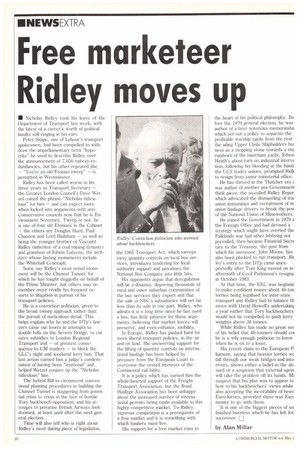Free marketeer Ridley moves up
Page 40

If you've noticed an error in this article please click here to report it so we can fix it.
• Nicholas Ridley took his leave of the Department of Transport last week, with the latest of a career's worth of political insults still ringing in his ears.
Peter Snape, one of Labour's transport spokesmen, had been compelled to withdraw the unparliamentary term "hypocrite" he used to describe Ridley over the announcement of 7,650 railway redundancies, but his other repeated jibe — "You're an old Etonian twerp" — is permitted in Westminster.
Ridley has been called worse in his three years as Transport Secretary — the Greater London Council's Dave Wetzel coined the phrase "Nicholas ridiculous" for him — and can expect more when locked into arguments with antiConservative councils now that he is Environment Secretary. Twerp or not, he is one of four old Etonians in the Cabinet — the others are Douglas Hurd, Paul Channon and Lord Hailsham — as well as being the younger brother of Viscount Ridley (inheritor of a coal mining dynasty) and grandson of Edwin Lutyens, the architect whose lasting monuments include the Whitehall Cenotaph.
Some say Ridley's most noted monument will be the Channel Tunnel, for which he has fought doggedly on behalf of the Prime Minister, but others may remember more vividly his frequent resorts to litigation in pursuit of his transport policies.
He is a conviction politician, given to the broad sweep approach rather than the pursuit of meticulous detail. This helps explain why he and the DTp's lawyers came out losers in attempts to double tolls on the Severn Bridge, to cut rates subsidies to London Regional Transport and — of greatest consequence to CM readers — to block the GLC's night and weekend lorry ban. That last action earned him a judge's condemnation of having been "irrational" and helped Wetzel conjure up the "Nicholas ridiculous" line.
The hybrid Bill to circumvent conventional planning procedures in building the Channel Tunnel is staggering from potential crisis to crisis in the face of hostile Tory backbench opposition, and his attempts to privatise British Airways look doomed, at least until after the next general election.
Time will also tell who is right about Ridley's most daring piece of legislation, the 1985 Transport Act, which sweeps away quantity controls on local bus services, introduces tendering for local authority support and privatises the National Bus Company into little bits.
His opponents argue that deregulation will be a disaster, depriving thousands of rural and outer suburban communities of the bus services they expect and that the sale of NBC's subsidiaries will net far less than its sale in one part. Ridley, who admits it is a long time since he last used a bus, has little patience for these arguments, believing that market forces will preserve, and even enhance, mobility.
In Europe, Ridley has pushed hard for more liberal transport policies, in the air and on land. His unswerving support for the lifting of quantity controls on international haulage has been helped by pressure from the European Court to overcome the vested interests of the Continental rail lobby.
It is a policy which has earned him the whole-hearted support of the Freight Transport Association, but the Road Haulage Association has been unhappy about the increased number of international permits being made available in this highly competitive market. To Ridley, vigorous competition is a prerequisite of a free market and it is something with which hauliers must live.
His support for a free market runs to the heart of his political philosophy. Be fore the 1970 general election, he was author of a later notorious memorandul which set out a policy to separate the profitable warship yards from the rest the ailing Upper Clyde Shipbuilders bw ness as a stepping stone towards a ma rundown of the merchant yards. Edwai Heath's about-turn on industrial intervc tion, following his blooding at the hand the UCS trades unions, prompted RidI4 to resign from junior ministerial office.
He has thrived in the Thatcher era a was author of another pre-Government think piece, the so-called Ridley Repor which advocated the dismantling of trai union immunities and recruitment of nc union haulage drivers to break the pov, of the National Union of Mineworkers.
He joined the Government in 1979 a the Foreign Office and had devised a strategy which might have averted the Falklands war had other lobbying not prevailed, then became Financial Seen tary to the Treasury, the post from which his successor, John Moore, has also been plucked to run transport. Ric ley's entry to the DTp came unexpectedly after Tom King moved on in aftermath of Cecil Parkinson's resignai in October 1983.
At that time, the EEC was beginnir to make confident noises about 40-ton lorries being legalised for inter-state transport and Ridley had to balance th move with David Howell's undertakii4 a year earlier that Tory backbenchers would not be compelled to push lorry weights above 38 tonnes.
While Ridley has made no great sec of his belief that 40-tonners should col he is a wily enough politician to know when he is on to a loser.
His recent claim to the European F.; liament, saying that heavier lorries we fall through our weak bridges and into rivers, shows either a belief in the absurd or a suspicion that external agem will take the problem off its hands. M: suspect that his plan was to appear to bow to his backbenchers' views while also accepting the inevitability of heavi Euro-lorries, provided there was Eure money to go with them.
It is one of the biggest pieces of un finished business which he has left for successor. 111
by Alan Millar




















































































